Climate change forces Kenyan pastoralist families to send their daughters to school
In Kenya’s poorest region, going to school requires great sacrifices, but David Edapal is convinced that education guarantees his daughter a good future.
There is a rustle of dry twigs as goats try to make their way out of their pen through narrow openings. 12-year-old Rebecca Atubo carefully guides baby goats into their own cage before letting the adult goats loose. Soon, the goats are ambling towards pastures in the gentle early-morning sun.
In a few hours, the temperature rises and turns to relentless heat, and it is hard to find shade in the desert-like environment.
”Herding is hard work when it’s so hot, and you’re thirsty all the time,” Rebecca describes.
Still, Rebecca is obedient and does what is asked of her.
For thousands of years, the nomadic people of Northwest Kenya have made their living raising cattle, and children have taken responsibility for the family’s goats and cows at a young age.
However, the distance to pastures has grown longer. There is no green in sight in the yellowish-gray landscape outside the family’s huts. Rebecca’s father David Edapal has been worried for a long time. He cannot say how old he is, but the lines on his face reveal he has seen several decades in Turkana, the poorest county in Kenya.
”The weather has grown warmer, and there are much fewer rains than before. In order to get water, we have to walk for two hours one way every day to get to the nearest river,” says Edapal.
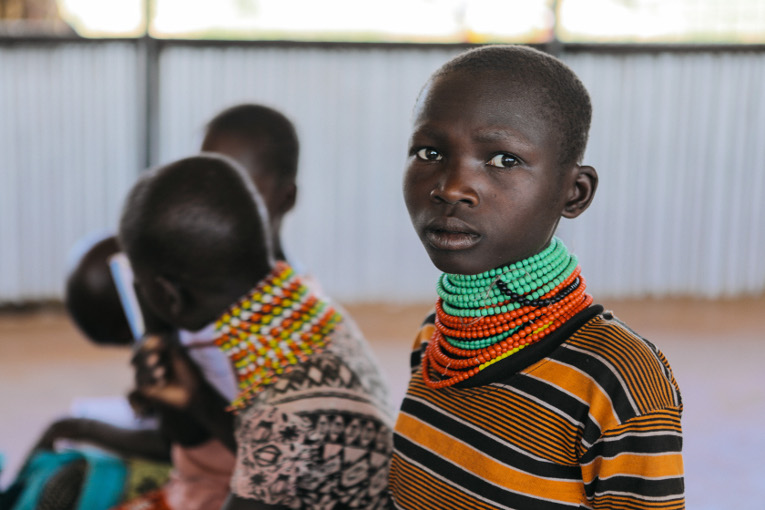
Rebecca says she prefers school to herding. Because of the heat, herding is hard work for both children and adults, and according to Rebecca, the thirst is the worst part.
Tested by drought
Severe periods of drought are testing Turkana more and more frequently. The drought in 2017 was the worst in decades. Hundreds of thousands of animals died due to lack of water as well as diseases.
This was a hard blow for the pastoralists, who traditionally move to follow the rains. Livestock are like a bank account on legs – they are used to fulfil all needs. Livestock provide milk and meat for food. Selling livestock brings in money to pay for things such as healthcare.
In addition, men need livestock to pay dowry to the family of the bride when they get married. The death of livestock hit families like an economic recession.
”Animals ravaged by drought cannot be sold or eaten, and they provide much less milk,” Edapal explains.
The crisis also fuels tensions among pastoralist people. They compete for the shrinking pastures, and extreme poverty makes stealing cattle a tempting prospect. A camel shepherd passing by carries an assault rifle on his shoulder to keep thieves at bay. Adding to the insecurity is a stream of firearms coming to Turkana across the border from neighbouring war-torn South Sudan.
For a pastoralist, questions about property are about as personal as asking a Finn about their salary. Most keep the number of livestock to themselves. However, Edapal reveals that cattle thieves took about two hundred of the family’s animals.
The family fled the insecurity into their current place of residence in the village of Ageles near the town of Lokichar. Edapal’s wife Aseken Namasi says all their hardships hurt her heart.
”The worst moment was when thieves killed four of my friends in front of my eyes when I was retrieving water,” she says. ”You can always get more livestock, but you can never replace a human being.”
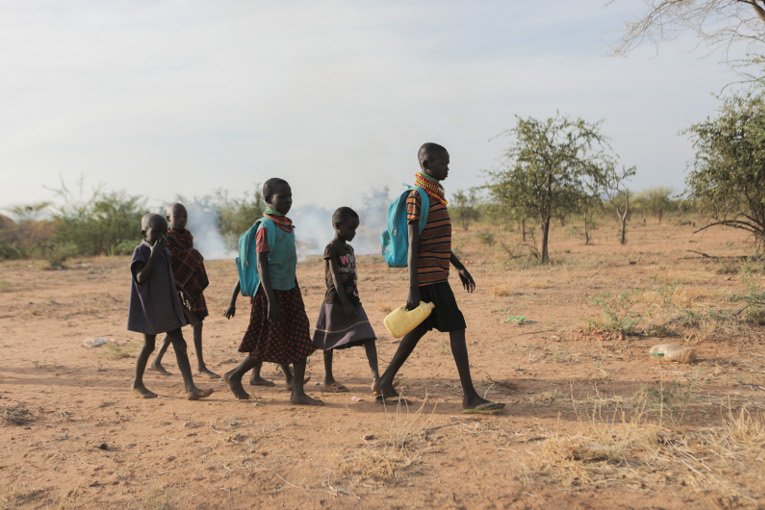
Rebecca Atubo, 12, (in front) walking to school with her friends. It is important to have the school close to home, as the journey to school is filled with danger in Turkana.
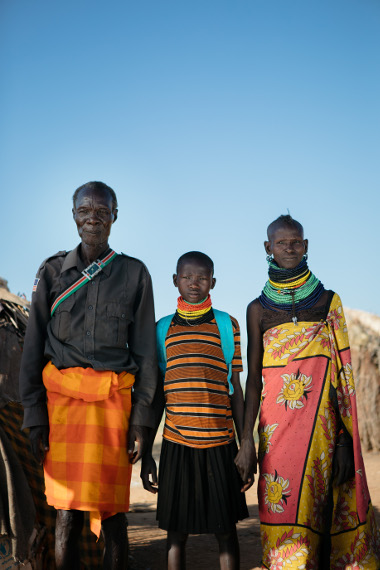
12-year-old Rebecca Atubo’s (middle) parents David Edapal (left) and Aseken Namasi sent their daughter to school. The shift from nomadic culture to a view of life that values education is seen strong in Turkana.
Almost all inhabitants of Turkana are pastoralists. Boys are brought up to raise cattle, and girls are expected to add to the family’s wealth by marrying. The dowry goes to the entire extended family.
Child marriage is still common. Because of the expectations of the traditional lifestyle, pastoralist people used to have little respect for education.
When Alice Loro Lele got to school age, her mother wanted her to go to school, but her father resisted. In anger, her father threw them both out, and with no livestock, they were destitute.
After comprehensive education, Alice could not afford to go to high school. Today, Alice is a 20-year-old mother of three, and lives in a hut in Lokichar with her mother.
”I married at 15, because I thought my husband would take care of us. I was foolish, and I didn’t know much about anything,” Alice says, clearly upset.
Her husband never paid dowry, which is another example of the plight of the nomadic people. As a gifted student, Alice got a job as a preschool teacher. She also started a general store. But her husband kept all the profits and started drinking. Alice gave birth to two children, but her husband did not care about them.
”When I was pregnant for the third time, my husband was going to get a second wife. I left him and moved back in with my mother,” Alice says.
Turkana lives under the poverty line
Places like Turkana are far from the reality of the capital Nairobi. Kenyan economy has grown at a rapid pace. Nairobi is teeming with skyscrapers, technology, and innovative mobile phone applications. In Turkana, most people live in villages with no electricity or running water.
In Nairobi, 22 percent of the people live under the poverty line, while in Turkana, the number is 88 percent. The disparity is largely due to education. In Nairobi, almost everyone has at least completed comprehensive school – in Turkana, 18 percent.
Pastoralists are moving into towns of Turkana with hope of work, but few of them even know how to read.
”We encourage families to send their children to school. More and more people see this as a solution in the long term,” says FCA education coordinator Miriam Atonia.
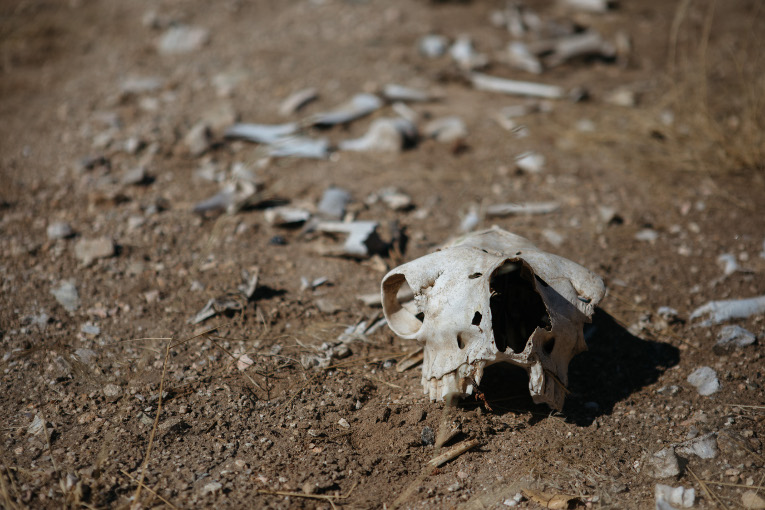
Hundreds of thousands of animals died during the drought of 2017. The drought had catastrophic repercussions for the nomadic people whose livelihood depends on raising cattle.
Things are moving in the right direction. Today, over half of the school-aged children and young people in Turkana go to school. Almost 27,000 started school in the poorest counties in Kenya in FCA projects during 2018.
Alice was offered a scholarship to study at a high school in Lokichar. She also thanks her mother for her support: mother looks after Alice’s children while she is at school.
”My heart breaks because I see my children so rarely. But we have to make some sacrifices; if we’re idle, we can’t improve our situation,” she says.
”I want to become a teacher because I want to encourage girls to go to school. I can give them the kind of advice I needed myself.”
It is hard to communicate the benefits of education to parents who have led a nomadic life. Edapal and Namasi did not go to school, but after a great deal of consideration, they decided to send their daughter Rebecca off to get an education.
”I have seen how the people of my generation, those who went to school, are succeeding. If we had received an education, we would be sleeping on mattresses, and our hut would have a tin roof instead of cloth,” he muses.
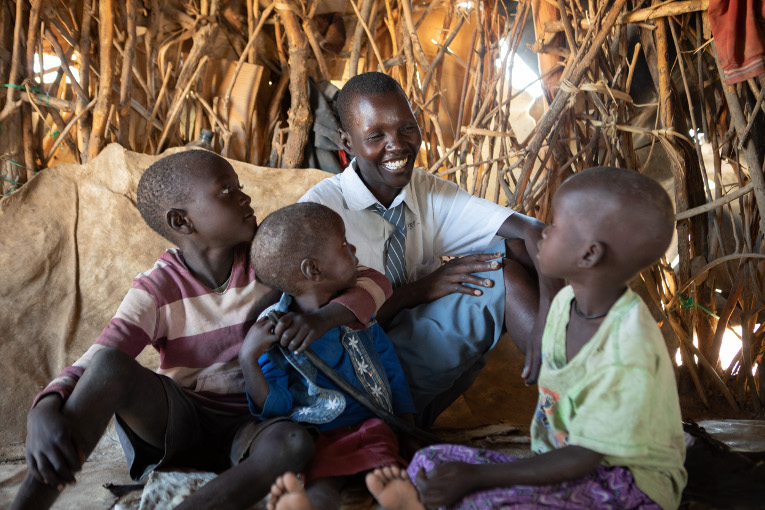
Alice Loro Lele (left) goes to school and takes care of her three children. She happy, that she decided to return to school.
A woman with an education is independent
After letting the goats out to pasture, it only takes Rebecca a few minutes of walking to get to the first lesson of the day. Edapal compares education to marriage – Rebecca is now married to school. An educated woman does not need to depend on others. She can make her own decisions regarding marriage once she is has finished her schooling.
Edapal feels proud when after her school day, Rebecca tells him about what she has learned.
”I hope Rebecca finds herself a job she likes, and God willing, can even help her parents in the future. Education provides lots of opportunities which I can’t even imagine.”
Text: Erik Nyström, Translation: Elina Vuolteenaho, Photos: Tatu Blomqvist / Ville Nykänen
Take part in the Common Responsibility Campaign at yhteisvastuu.fi, In addition, see the touching TV documentaries on the Yle channels starting from the beginning of February.